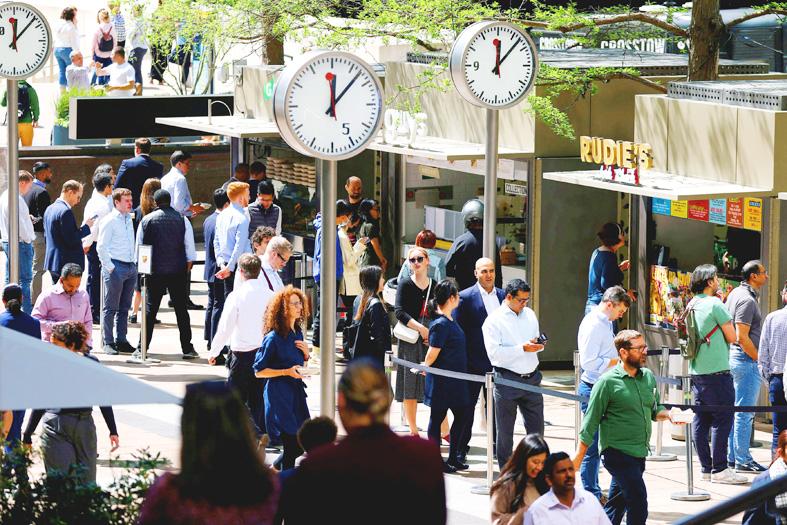British annual inflation last month surged to a 40-year high on rising fuel and food prices, official data showed yesterday, adding to a cost-of-living crisis.
The Consumer Prices Index (CPI) last month jumped to 9.4 percent from 9.1 percent in May, the British Office for National Statistics said in a statement.
Analysts said the data put pressure on the Bank of England (BOE) to raise interest rates by as much as 50 basis points at its next policy meeting next month.

Photo: Reuters
The central bank expects British inflation to top double-digit percentages this year.
“In the UK, we saw another eye-popping CPI reading and the pressure is on the BOE to do what it takes before it is too late to control inflation,” Avatrade chief market analyst Naeem Aslam said.
Inflation has soared to the highest level in decades in many countries, fueled by Russia’s war in Ukraine and the easing of COVID-19 restrictions.
That has forced central banks to raise interest rates, risking the prospect of recession as higher borrowing costs hurt businesses and consumers.
The Bank of England has raised its key interest rate five times since December last year, lifting it to 1.25 percent from a record-low 0.1 percent.
The central bank has not increased its rates by more than 0.25 percentage points each time.
However, BOE Governor Andrew Bailey on Tuesday said that “a 50 basis point increase will be among the choices on the table when we next meet.”
Separate data this week showed that soaring inflation has caused the value of British wages to fall at a record pace.
Moreover, the UK is experiencing a summer of strike action as a result of the cost-of-living crisis.
Aircraft refuelers at Heathrow Airport near London are set to strike for three days later this week, while this month sees telecom BT PLC facing its first staff walkout since 1987.
Railway staff are preparing for further stoppages after last month carrying out their biggest strike action in decades.
State-employed lawyers are also striking, while teachers and workers for the British National Health Service are mulling action.
Britain’s retail prices index — which includes mortgage interest payments, and is used by unions and employers when negotiating wage increases — rose to 11.8 percent last month from 11.7 percent in May, the statistics office said.
“More pain is on the way for household budgets as the high rate of inflation continues to outpace wage growth, bringing down the real value of incomes across the UK,” KPMG UK chief economist Yael Selfin said. “We also expect the Bank of England to continue raising the base interest rate, which we now expect to reach 2 percent early next year, to stave off further rounds of inflation rises.”

In Italy’s storied gold-making hubs, jewelers are reworking their designs to trim gold content as they race to blunt the effect of record prices and appeal to shoppers watching their budgets. Gold prices hit a record high on Thursday, surging near US$5,600 an ounce, more than double a year ago as geopolitical concerns and jitters over trade pushed investors toward the safe-haven asset. The rally is putting undue pressure on small artisans as they face mounting demands from customers, including international brands, to produce cheaper items, from signature pieces to wedding rings, according to interviews with four independent jewelers in Italy’s main

Japanese Prime Minister Sanae Takaichi has talked up the benefits of a weaker yen in a campaign speech, adopting a tone at odds with her finance ministry, which has refused to rule out any options to counter excessive foreign exchange volatility. Takaichi later softened her stance, saying she did not have a preference for the yen’s direction. “People say the weak yen is bad right now, but for export industries, it’s a major opportunity,” Takaichi said on Saturday at a rally for Liberal Democratic Party candidate Daishiro Yamagiwa in Kanagawa Prefecture ahead of a snap election on Sunday. “Whether it’s selling food or

CONCERNS: Tech companies investing in AI businesses that purchase their products have raised questions among investors that they are artificially propping up demand Nvidia Corp chief executive officer Jensen Huang (黃仁勳) on Saturday said that the company would be participating in OpenAI’s latest funding round, describing it as potentially “the largest investment we’ve ever made.” “We will invest a great deal of money,” Huang told reporters while visiting Taipei. “I believe in OpenAI. The work that they do is incredible. They’re one of the most consequential companies of our time.” Huang did not say exactly how much Nvidia might contribute, but described the investment as “huge.” “Let Sam announce how much he’s going to raise — it’s for him to decide,” Huang said, referring to OpenAI

The global server market is expected to grow 12.8 percent annually this year, with artificial intelligence (AI) servers projected to account for 16.5 percent, driven by continued investment in AI infrastructure by major cloud service providers (CSPs), market researcher TrendForce Corp (集邦科技) said yesterday. Global AI server shipments this year are expected to increase 28 percent year-on-year to more than 2.7 million units, driven by sustained demand from CSPs and government sovereign cloud projects, TrendForce analyst Frank Kung (龔明德) told the Taipei Times. Demand for GPU-based AI servers, including Nvidia Corp’s GB and Vera Rubin rack systems, is expected to remain high,